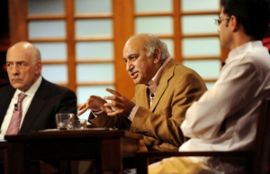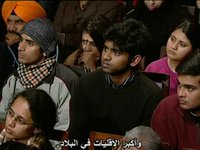This House believes Muslims aren't getting a fair deal in India
Monday February 15 2010
St. Stephen's College, Delhi
MOTION REJECTED
by 38% to 62%
Details

The Qatar-based Doha Debates staged an audacious discussion on discrimination against Muslims in India on Monday just three days after suspected Islamist terrorists killed nine people in a bomb blast in the west of the country.
More than 300 people in the audience at St Stephen's College, part of Delhi University, voted overwhelmingly by 62.1 per cent to 37.9 per cent against a motion that "Muslims are not getting a fair deal in India".
Security for the debate at St Stephen's college, one of India's most prestigious university campuses, was particularly tight with the theme of the debate only publicised two days before the event took place. "There have been minor incidents during debates in the past with demonstrators shouting obscenities and even spitting at the debaters on stage so we were particularly sensitive to any possible trouble," said a member of the student organising committee.
Speaking against the motion, Sachin Pilot, India's Minister of State for Communications and Information Technology, claimed the government was addressing cases where Muslims had been disadvantaged, but insisted they played a full part in Indian life. "Muslims are represented by the top three Bollywood actors, they are in the top echelons of sports and culture. Muslims have a better deal in India than they have in any neighbouring country or indeed anywhere in the world."
Received to loud applause as a former graduate of St Stephen's, which currently has six alumni in India's government cabinet, Pilot made history in 2004 when he became India's youngest member of parliament.
He pointed out that India, where Muslims have lived alongside people of many other religions in peace for hundreds of years, was one of the only countries in the world where Muslims have declared a fatwa against terrorism.
M.J. Akbar, a journalist and publisher and himself a Muslim, joined Pilot in dismissing suggestions that Muslims were not getting a fair deal in a country where for "decades they have been engaged in uninterrupted democracy". While admitting that some lived in severe deprivation, he said their situation was no worse than a proportional cross-section of any other religious group.
India's 130 million Muslims represent 13 per cent of the country's 1.17 billion population.
Seema Mustafa, a journalist and political commentator, arguing for the motion, said the government had done little for Muslims who had been especially victimised by security forces since the 9/11 attacks on America.
Muslims had also been barred from many jobs in the Indian civil service although she admitted that India had had three Muslim presidents since independence.
Teesta Setalvad, a prominent civil rights activist, claimed that Muslims were being excluded from the "elite political and economic leadership of India. "The Muslim today lives in a segregated class leading to ghettoisation and a consequently very dangerous situation. Above all, Muslim women are discriminated against to make sure a credible leadership does not emerge."
She said that wherever there was "a level playing field, Muslims succeed" and that while "Indian people" can accept Muslims at every level "it is the government that is prejudiced."
The Doha Debates make a point of discussing highly controversial issues. Last year in Washington they argued a motion that it was "time for the US administration to get tough on Israel" which was supported by 63 per cent of the audience at Georgetown University. The year before, at Cambridge University in the UK, participants rejected a motion that Britain's role in the Middle East was "in terminal decline" by 68 to 32 per cent.
Watch online

